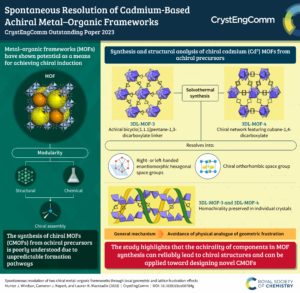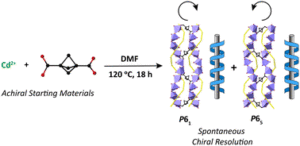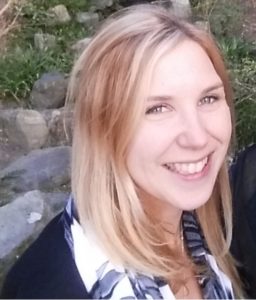We are delighted to announce the winner of the CrystEngComm Outstanding Paper Award, 2023!
First launched in 2022, the Outstanding Paper Award is an award aimed at recognising the high-quality work published in CrystEngComm from the previous year, acknowledging the excellence of the paper as a whole and recognising the contributions of all the authors.
Congratulations to the winners of the CrystEngComm Outstanding Paper Award 2023, as selected by the Editorial Board, for their work on Spontaneous resolution of two chiral metal–organic frameworks through local geometric and lattice frustration effects: Hunter J. Windsor, Cameron J. Kepert and Lauren K. Macreadie.
The authors presented two chiral metal–organic frameworks that are differentiated by their Cd-centred helical twists and are prepared by spontaneous chiral resolution from rigid, aliphatic, and achiral precursors.
Read the full outstanding article:
Meet the authors of this Outstanding Paper
Hunter J. Windsor
 Hunter Windsor received his PhD in chemistry in 2022 from the University of Sydney. His research involved exploring spin crossover metal–organic frameworks and modulation of their magnetic properties through guest confinement. He is currently a postdoctoral research associate for Professor Les Field at the University of New South Wales where he is investigating the reactivity of small molecules such as carbon dioxide and acetylene with ruthenium-centred organometallic complexes. Hunter is passionate about teaching crystallography and is interested in developing new methods for crystallising reactive species that have otherwise eluded characterisation.
Hunter Windsor received his PhD in chemistry in 2022 from the University of Sydney. His research involved exploring spin crossover metal–organic frameworks and modulation of their magnetic properties through guest confinement. He is currently a postdoctoral research associate for Professor Les Field at the University of New South Wales where he is investigating the reactivity of small molecules such as carbon dioxide and acetylene with ruthenium-centred organometallic complexes. Hunter is passionate about teaching crystallography and is interested in developing new methods for crystallising reactive species that have otherwise eluded characterisation.
Cameron Kepert is a Professor in the School of Chemistry at the University of Sydney. He received his B.Sc. (Hons) from the University of Western Australia, PhD from the Royal Institution of Great Britain/University of London and was a Junior Research Fellow at the University of Oxford from 1995-1998. He is a recipient of the Australian Prime Minister’s Prize for Physical Scientist of the Year, the Le Fèvre Memorial Prize of the Australian Academy of Science, the Burrows Award and Rennie Medal of the Royal Australian Chemical Institute. His research interests include nanoporous metal—organic framework materials, spin-crossover, molecular magnets, molecular conductors, and negative thermal expansion materials.
Lauren K. Macreadie
Dr Lauren Macreadie is an ARC DECRA fellow and a UNSW Scientia Fellow at the University of New South Wales and investigates how porous materials can be used to solve our key energy questions around hydrogen storage and transport, and chemical separations. Following the completion of her PhD at the CSIRO and Monash University in 2016, she worked at Trinity College in Dublin, Ireland, on water splitting MOF systems, followed by research with the CSIRO in Melbourne on MOFs as adsorbents for respiratory canisters with the Defense Science and Technology group. Lauren then became a lecturer at Massey University in New Zealand in 2020. In 2021 she began her DECRA fellowship at the University of Sydney and moved to UNSW in 2022.
Please join us in congratulating this year’s winners!














